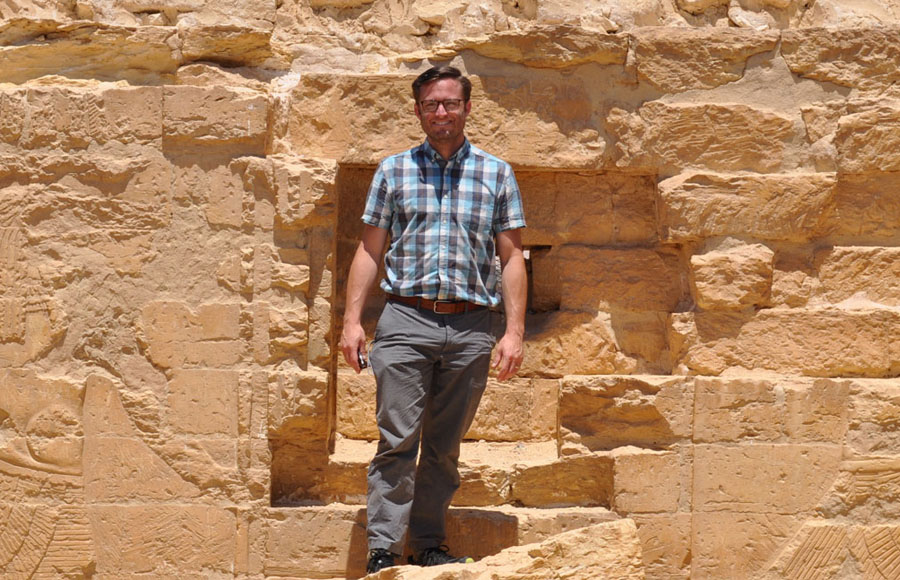Dr. Davis Hankins studies religion from a range of personal interests: literature, art, philosophy and psychology. He attributes this resourcefulness to having received a broad liberal arts education.
As a student, he said he took courses in many fields. As a scholar, he now answers cross-disciplinary questions from an equally broad perspective, which led to his receiving the prestigious 2017 Manfred Lautenschlaeger Award for Theological Promise.
He encourages today’s students to develop an appreciation for Appalachian’s interdisciplinary opportunities.
“None of today’s most pressing concerns – like food insecurity, climate change, racism, sexism – nor any of life’s most urgent questions like ‘What makes for a flourishing life?’ can be classified as simply a matter of one discipline,” Hankins said.
“Make space in your curriculum for exposure to various disciplines. It becomes increasingly difficult as you advance in your specialization, so take advantage of your opportunities as early and often as possible.”
Job, Ecclesiastes and liberated discoveries
Hankins was one of 10 winners of the international Manfred Lautenschlaeger Award, presented by the Forschungszentrum für Internationale und Interdisziplinäre Theologie (Research Center for International and Interdisciplinary Theology) for outstanding first books in theology.
Hankins was honored for his work “The Book of Job and the Immanent Genesis of Transcendence” (Northwestern University Press, 2014).
Dr. Brennan W. Breed, assistant professor at Columbia Theological Seminary, described the honor as “richly deserved” because Hankins’ “thoroughly interdisciplinary work breaks new ground in several fields at once, most notably in biblical studies, philosophy and psychoanalysis.
“Davis’ book is also a testament to the excellent research and teaching capacity of the religion and philosophy department at Appalachian State University,” he said.
Hankins is an assistant professor of religious studies in Appalachian’s College of Arts and Sciences. He also is a faculty affiliate in the Center for Judaic, Holocaust and Peace Studies and the gender, women’s and sexuality studies program.
He uses modern literary and philosophical theory to study history, literature, religion and society.
With his first book, Hankins sought to demonstrate why the Bible’s Book of Job continues to be important for philosophical studies of contemporary questions, such as the limits and possibilities of desire, perception, existence and belief. His work demonstrates how the Book of Job is relatable to today’s world through its questions of spirituality, ethics, and the role of trauma and disaster, all of which were part of Job’s experience.
Hankins’ next book, now in progress with Breed as co-author, evaluates the historical and influential use of the Book of Ecclesiastes, written during a time of social and economic change that profoundly influenced development of Jewish thought. Their research in Egypt, Italy and Germany has been supported by a Student and Faculty Excellence (SAFE) grant from Appalachian’s College of Arts and Sciences.
How does such research inform Hankins’ teaching?
“Most classes that I teach include some attention to the history of the Bible’s uses and impact in various communities – whether Jewish, Christian, Muslim or otherwise,” he said. “Ecclesiastes is a fun subject to treat in the classroom. For example, students might have to research how a single text or perhaps a character has been used in different ways in art, literature, politics, religion, etc. Assignments leave them open to discover anything from the millennia of rich engagement with these texts.”
This teaching method rouses students’ curiosity and “emboldens them with a sense of freedom to risk their own interpretations,” Hankins said. “I hope that such assignments break students out of the constricting desire to settle on ‘what this text means,’ and incite their liberated drive to discover ‘what this text can do.’”
What do you think?
Share your feedback on this story.
About the Department of Philosophy and Religion
The Department of Philosophy and Religion invites students to explore the world, examine beliefs, understand a diversity of worldviews, and challenge the ideas and values that instruct our lives. The department offers a Bachelor of Arts in philosophy and a Bachelor of Arts in religious studies, as well as a minor in both of these areas. Learn more at https://philrel.appstate.edu.
About the College of Arts and Sciences
The College of Arts and Sciences (CAS) at Appalachian State University is home to 17 academic departments, two centers and one residential college. These units span the humanities and the social, mathematical and natural sciences. CAS aims to develop a distinctive identity built upon our university's strengths, traditions and locations. The college’s values lie not only in service to the university and local community, but through inspiring, training, educating and sustaining the development of its students as global citizens. More than 6,800 student majors are enrolled in the college. As the college is also largely responsible for implementing App State’s general education curriculum, it is heavily involved in the education of all students at the university, including those pursuing majors in other colleges. Learn more at https://cas.appstate.edu.
About Appalachian State University
As a premier public institution, Appalachian State University prepares students to lead purposeful lives. App State is one of 17 campuses in the University of North Carolina System, with a national reputation for innovative teaching and opening access to a high-quality, cost-effective education. The university enrolls more than 21,000 students, has a low student-to-faculty ratio and offers more than 150 undergraduate and 80 graduate majors at its Boone and Hickory campuses and through App State Online. Learn more at https://www.appstate.edu.





![How NCInnovation Is Rethinking Economic Development in North Carolina [faculty featured]](/_images/_posts/2026/02/rethinking-economic-development-600x400.jpg)







